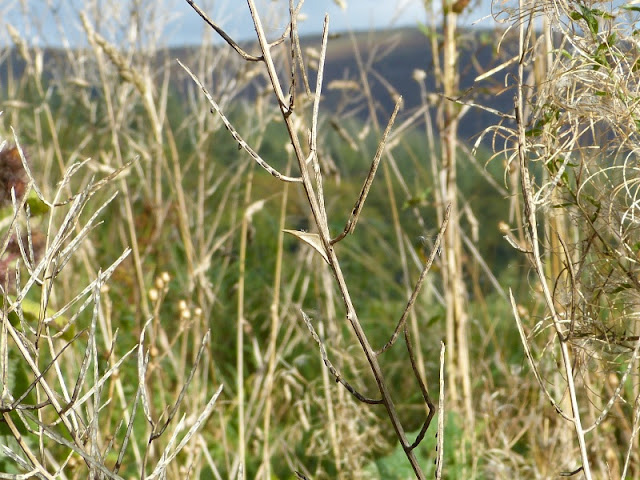Following on from my posts about caterpillars that I had
observed through to being butterflies last year, here is the story of some
Orange Tips from this year.
Last July I was working on an old railway that is now a walkway
and cycle path. I noticed a number of dried up Garlic Mustard seed heads along
the edge of the path. I checked the seed heads and managed to spot two Orange
Tip chrysalises.
The chrysalises are beautifully camouflaged and look just
like a thorn, or part of the seed head.
I realised later that the plants along the edge of the path
are cut back each year, so the next time I was there I found three chrysalises
on the plants which would have been cut and took them away with me.
The seed heads with the chrysalises attached lived in my
garage over the winter, next to the window.
Every couple of weeks I would spray
them with water to stop them drying out. I wasn't sure if this was necessary,
but my reasoning was that if they were outside they would have been rained on,
so I thought it was necessary.
Towards the end of April, I noticed that one of the
chrysalises had started to change colour, showing the wing pattern of the
butterfly. The other two chrysalises also changed shortly afterwards, revealing
that they were all going to be boys!
On 29th April the first butterfly emerged, over nine months
since I collected the chrysalis. The next butterfly emerged on 30th April and
the third one emerged on 1st May. Although, yet again, I didn't see the
butterflies emerge, two of them were waiting for me when I arrived home from
work. The top of the container was left unzipped for them, but they appeared to
be quite happy just sitting on the side of it.
It was good to know that I had helped three butterflies to
survive, that would otherwise have been mashed up by a mower!
I planted a Garlic Mustard plant in a pot in the garden this
year and I was delighted to see an egg on it on 19th May. I can't say when it
was laid, but it was orange meaning that it was at least a day old.
On the 1st June I noticed a small caterpillar on the plant,
which had probably hatched the previous day and today when I was searching for
it, I noticed that there are two caterpillars on the plant, each on different
flower stems.
And so the cycle continues!!






Well done Nick for increasing your local population of this delightful species. Whilst we get an occasional visitor to our garden it is a rarity on my transect with only one female seen earlier this year.
ReplyDeleteThanks Frank. I think they need all the help they can get, particularly with the amount of chemicals the farmers around here spray around the place! I am so pleased that we had a decent number of Orange Tips around this year. If not, I would have seen hardly anything on my transect
DeleteWow you are so successful with your metamorphosis. You are very patient, i can't imagine the 9 moths caring and observing! Those are lovely butterflies and i am glad you have helped them through their cycle assuring the continuity of the species, at least for now.
ReplyDeleteIn my yard i always see Scarlet Mormon larvae which i always observe on weekends. Out of 3 larvae from 3 citrus trees only one became close to pupation, even got pictures. Then the next weekend i can't find it anymore, i guess those birds got it. The other 2 larvae got parasitized, and i saw 2 abnormal structures with holes at the back. Maybe that is the area where the wasp parasite emerged! I am sad for our Scarlet Mormon.
Hi Andrea, I have been very lucky the last few times. I have a couple of mesh cages that I keep the caterpillars in, usually, which protect them from predators. I did notice last night that my Orange Tip caterpillars have disappeared. I am not sure if they have formed chrysalises or become bird food. I will need to have a good look for them at the weekend.
DeleteIt is always disappointing when caterpillars or chrysalises are parasitized. I have had that happen several times in the past.
I can't believe how well the chrysalises is camouflaged. It's also so different the inside from the outside of the butterfly. It's a whole different wing pattern on each side.
ReplyDeleteHi Maria,
DeleteYes, the chrysalis is a marvel of evolution. I spent years looking for them. Once I found my first one I have been able to spot a few more, but it is certainly not easy. The camouflage on the underside of the Orange Tip's wings is also fantastic. When it perches on Garlic Mustard plants it looks just like a little bunch of white flowers. And I love the markings on the top side of the wings - so bright and cheerful.